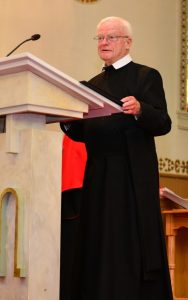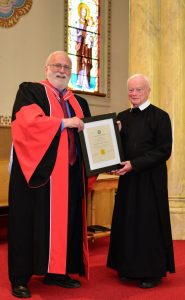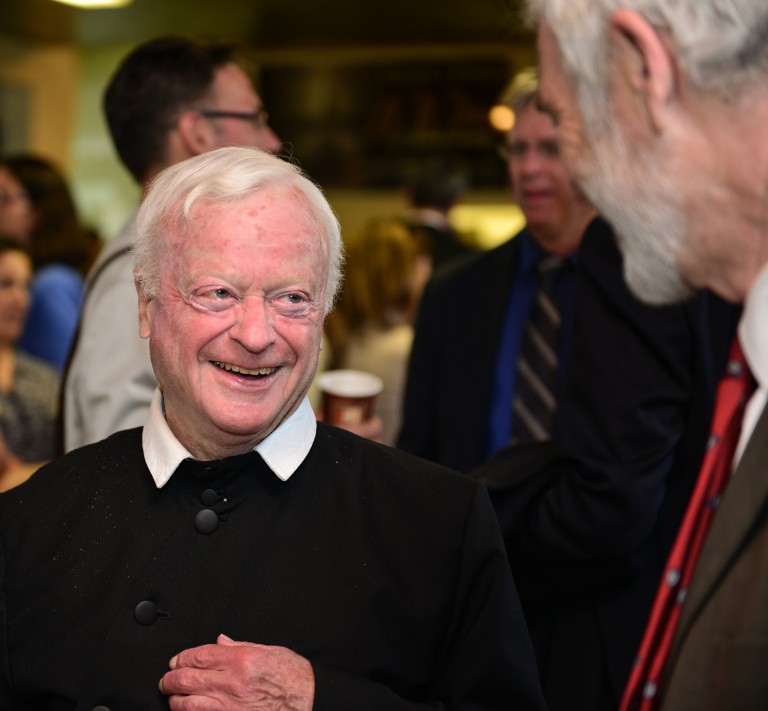13 Jun St Philip’s Seminary Rector Honoured at Our Lady Seat of Wisdom Academy
 On April 30, Fr Jonathan Robinson, Provost of the Toronto Oratory and Rector of St Philip’s Seminary, received the Culture of Life Award and delivered this Address at the 2016 Graduation Ceremonies for Our Lady Seat of Wisdom Academy, in Barry’s Bay, Ontario.
On April 30, Fr Jonathan Robinson, Provost of the Toronto Oratory and Rector of St Philip’s Seminary, received the Culture of Life Award and delivered this Address at the 2016 Graduation Ceremonies for Our Lady Seat of Wisdom Academy, in Barry’s Bay, Ontario.
I suppose there is a recognizable form, template, or protocol, for a graduation address. It goes something like this.
First of all, there should be a reminder to the graduating class of all they owe to their teachers over the past years, and more generally to the institution from which they are graduating. Then, there should be a stern warning that now that their studies are over, the students must be prepared to face the harsh world of reality. It will no longer be a question of working hard enough to get half way decent marks, half way decent marks in subjects that no one out there really holds in very high regard; no longer will it be enough to take part in sports which will qualify one as an o.k. member of the student body – oh no, the future will be a nine to five job, with, probably, in a few years time, the responsibilities of marriage and a family. You are about to be hit by reality; and you will be forced to grow up. “When I was a child,” as St Paul says “I spoke like a child, I thought like a child, I reasoned like a child, when I became a man I put away childish things” (1 Cor. 13:11). Well, so the dreary template goes on to say, you are leaving academic life, and can look forward to taking your part in grown up life, in real life.
This approach is wrong. It is not all wrong in all it actually says – such as the need for gratitude towards those who have educated you – but the tone, and the thrust of the template, is all askew. I would like to suggest that before you start looking ahead – looking ahead with more or less confidence – you should begin by examining where you have come from, and what sort of use you have made, so far, of the opportunities afforded you. In fact, I am suggesting that you look back – look back, not in anger as John Osborne had it in his play – but look back to see what you can learn about the self that is going to face the future, and how best to develop what that self has in it to become.

Fr. Jonathan Robinson is given the Culture of Life Award by Dr. Keith Cassidy, President of Our Lady Seat of Wisdom
First of all, none of you comes from nowhere: you all have, or have had, parents, you inherit an existence as members of particular social environment or community, you have friends and an education, you have a country. Furthermore, you are, all of you, subject to the relentless pressures of various sorts of media, which are eager to tell you about everything; everything from the sort of toothpaste you should buy right through to exhortations to patronize the most tasteful and economical funeral director in your neighbourhood. Sooner or later, if you are to escape becoming nothing but a number on a chart, you will have to begin to take stock of this inheritance and these pressures. But not just take stock of your inheritance and these pressures, but to try to evaluate them, and formulate you own responses. You must not be content to be like a piece of driftwood, floating unresisting in the current, you must not behave like a sponge or piece of blotting paper with no centre of their own, sponges and blotting paper that absorb what everyone else is thinking, or what the latest ad has to tell you about how to live the good life.
In saying you have to come to come to terms with where you have come from, and that you have to learn to deal, in your own way, with the many different pressures that surround you everywhere and at all times, I am not suggesting precisely what you should do with that inheritance, and those pressures. All I have said, is that you recognize you are somebody with a history, and a somebody who is under relentless pressure to conform. If you fail to come to grips with who you are, and make some effort to note and evaluate the pressures you are under, then, you will never be anything more than one of a crowd, with no real identity of your own. Somehow, gradually, you have to learn to separate yourself out of the crowd, and that is going to requires traits of resoluteness, steadiness and courage. Even more importantly, the courage, the courage to be who you are, will require clear-sightedness about your own life. Clear-sightedness about your own life, both from the perspective of where you come from, and of what you have made of it so far.
It is a fact, a fact that we would all like at times to forget, that we are building our own lives in everything that we do, or fail to do. There is no holiday away from this sometimes unwelcome truth that we are at every moment either strengthening or weakening our self as it develops through our own personal history. Because of this, as I say, somewhat unwelcome truth, we are all answerable for what we do. We are answerable to God, of course, for what we have made of ourselves, and we all have to face the particular judgement. The point, though that I am making here, is the more immediate one that it is to ourselves that we are answerable for what we become. It will not be mummy’s or daddy’s fault if you end up a junkie on Queen Street in Toronto, it will be your doing. You just would not come to terms with the fact that your freedom would be better used by saying no to experimenting with LSD – or whatever is the fashionable drug at the moment. I am not talking about blame in any narrow moralistic sense, I am only pointing out that freedom involves choices, that choices have consequences, and so, choices affect your future – like it or not.
Right decisions about life often seem to be more difficult to make than do disastrous ones. Right decisions have to be repeated time and time again if they are to become fixed aspects of our character. This requires constancy, and the determination not to give up. In the end, you are going to be what you do. To live an authentic human existence means trying not to hide in role playing: you know the sort of thing I mean, the model Catholic young man who is always polite and only has too much to drink on the odd occasion, or the much loved, gentle, firm and competent Catholic mum who is hardly ever guilty of detraction. You are not a role, you are a person – try to act yourself, don’t try to be something or someone that you are not. Furthermore, living an authentic human existence, as I said a moment ago, leaves no room for blaming other people for what you are making, and what you will have made of your lives.
But the truth of your own responsibility for what you make of your lives, has to be balanced by the fact that you don’t begin to build an authentic self from scratch. What I mean is this. We are, all of us, social beings who have been formed and moulded, to a large extent, by others, into the sort of persons we are. Long before there could be any critical reflection about who we are, or an evaluation of the pressures that surround us, we have absorbed a tacit sense of what life is all about; as we grow up we have become attuned to the patterns of living which exist in our surroundings. For example. people in our society react, in a knee-jerk sort of way, to hate crimes and to cruelty, and, they react in this way, because these sorts of reactions have become fundamental to our heritage. The commitments to natural rights and the dignity of persons, is supposed to be the lesson of the humanistic Enlightenment – and of course we are all enlightened or, at least, we want to be taken as such. Someone else, may tell you that these basic reactions are based on much earlier views of life, on the Greco-Roman belief that saw order in the cosmos, or on the Judeo-Christian conviction that all souls are equal before God I am not concerned here to probe these fundamental notions, I only want to call your attention to the fact that they exist They exist and, as acting agents, as individuals shaping what you are to become, you do this by falling into step with a sense of reality you inherit from your society. Your society which begins with your family. As agents, everyone of you, appropriates, and hands on to others, a sense of what is important in what you have inherited from your own, personal, historical tradition.
You are not going to develop into an authentic human being by pretending that this historical given-ness does not exist If you do not try to understand where you have come from, then you willdrift with the current You will drift with the current because you won’t really know who you are. An authentic human being is aware of his rootedness within the context of the culture which has formed him, and has some sense of his indebtedness to a larger drama of a shared history. John Donne encapsulated this truth in his famous phrase that no man is an island, entire unto himself. That is the truth of the matter, and it has to be recognized if you are going to accomplish anything of lasting value. Your Catholicism should have given you a sense of what I am talking about with its insistence that we are all members one of another in the Mystical Body of Jesus Christ, which is his Body the Church.
So, on the one hand, you have a personal responsibility to develop yourselves into authentic human beings; but, at the same time, this development is going to take place within your own, very determinate, historical order: what your family, what your schooling, what your culture in a broad sense, what your country, and last, but certainly not least, what the Church, have made you. How are we to fit these two truths together? The truth, on the one hand, that you are bound, as individuals, to try to become authentic human beings. Yet, on the other hand, you have, at the same time, to recognize that you are bound by your history, a history which makes any idea of an absolute freedom to make yourselves into anything you might fancy, an impossibility. If you are not to be like a piece of driftwood, or a sponge, or blotting paper, you are bound to try to become an individual, an individual who is something more than a number on a chart, or a mere instance of a kind. Yet at the same time, because of what your own personal historical development has been, you are not free to make yourself over into anything that might catch your interest in the passing moment.

Fr. Robinson enjoys a discussion with novelist and painter, Michael O’Brien, at the graduation reception
One answer, an answer as to how we are to reconcile the demand for authenticity with the given-ness of our own particular history, would be to look for models, models drawn from the real world. Models who have, on the one hand, achieved a high degree of selfhood and a remarkable sense of personal identity and authenticity; yet who have, at the same time, in fact, led lives embedded in their own culture. The German philosopher Heidegger taught that we require a hero if we are going to be able to follow in the footsteps of “what can be repeated.” What is he talking about? What is it that can be repeated? Well, what can, and what must be, repeated, is the daily, often hum-drum business of trying to do the right thing, and so to build up the virtues; virtues, which will constitute the fabric of a good, and even saintly, life. There is nothing stagey or dramatic about this effort to become authentic human beings. There is no hint here, of the long-haired, wild-eyed existentialist on the windswept hilltop defying the rain and the lightening, and everything and everybody else, and, so he thinks, displaying his authenticity. On the contrary, the effort to do the will of God in the real and daily circumstances of our lives often demands a quiet sort of hidden heroism, a heroism that is a world removed from what is stagey and dramatic.
This effort to find and do God’s will in the here and now, has been called the sacrament of the present moment. It is here and now that we have to try to practice the will of God: and so the here and now become the site of an encounter with God. Without this effort to take the present moment seriously, we will forever be at the mercy of an unfulfilled past, and an empty future. There is little hope of establishing the virtues in an unfilled past, and an empty future. You have to begin to become an authentic human being here and now. Aristotle taught us that without at least the effort to establish the virtues necessary for a good life, there will be no happiness in this world; and, as St Thomas might have added, without the effort to live a decent Catholic life, there also exists the very real chance of something very much worse, than the mere absence of happiness, in the life to come.
For a Catholic the heroes of life are the saints. The saints who teach us about “what can be repeated.” One thing the lives of the saints teach us is both the necessity and the art of living in the present moment. To live in the present moment without denying the past, the past which we carry with us, and, yet, at the same time, recognizing the future judgement that is to come on all our daily actions The judgement in the first place that we ourselves make on what we have become, but also the judgement of the Good God to whom all hearts are open and no secret is hid.
The writer of the Letter to the Hebrews tells us that: “It is a fearful thing to fall into the hands of the living God” (Heb 10 31). No doubt it is a fearful thing, but why exactly? It is not that God is out to get you, but because as St John of the Cross tells us: “In the evening they will examine thee in love.” That means a lot of things, not all of them very comfortable. One of the things he does tell us, however, and which he says most clearly, is that, in the end, we are going to be asked some pretty searching questions on how we have loved. Has our loving always been to try to get everything we can from the other person; or, let us hope, we will have discovered before it is too late, that love wants what is best for someone else. That sort of love drove our Lord to the Cross – where, I wonder, will it take you?

